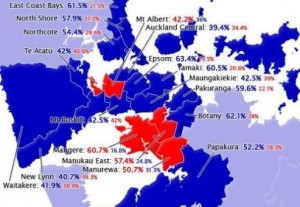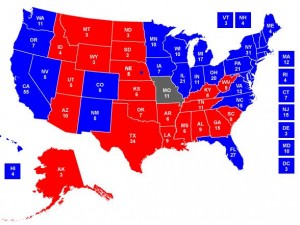We’re all familiar with how those political maps ended up looking after election night both here and in the US. The US once again had a swathe of red through its middle as the Democrats cleaned up on the coasts and in the north-east.
The map of New Zealand was a sea of blue – you have to drill down to see any red in the suburbs of Auckland, Dunedin and Christchurch. But what does it all mean? What factors go in to deciding that geographic and demographic split in voting decisions.
Some researchers in the US have been working on answering exactly that question and have published a book outlining their findings. You can read the 2005 research paper the book is based on here.
They claim to have found: “…that income matters more in ‘red America’ than in ‘blue America.’ In poor states,
rich people are much more likely than poor people to vote for the Republican presidential candidate, but in rich states (such as Connecticut), income has a very low correlation with vote preference.”
“Our results can be viewed either as a debunking of the journalistic image of rich “latte” Democrats and poor “Nascar” Republicans, or as support for the journalistic images of political and cultural differences between red and blue states- differences which are not explained by differences in individuals’ incomes.”
Science reviews the book (not online) favorably and summarises its findings:
“Rich individuals vote more Republican. Second, rich states (like Connecticut, with high average income residents) vote more Democratic. These conclusions are contrasted with a third, very intriguing finding: In poor states like Mississippi, income strongly predicts Republican voting, whereas in rich states like Connecticut, the rich and poor differ little in their voting patterns.”
The Auckland split (left) and the state of the map on election night in the US
So what of New Zealand? Well, it’s confusing that the political right here is represented by the blue of National and Labour is red. But it’s not a stretch to say that the battle for Auckland symbolises the political split in the country at present. Auckland is a sea of blue except for Mt Albert (Helen Clark’s stronghold), and the South Auckland electorates of Mangere, Manukau East and Manurewa.
That would suggest that to invert the US findings in terms of colour, income matters more in ‘blue New Zealand’ than in ‘red New Zealand.’ But is it that simple? No, argue Andrew Gelman and his fellow authors, who found that in states where average income was higher, it is more likely that a Democratic presidential candidate will be supported.
Fascinating stuff, a book or some research at least, based on the outcome of the New Zealand elections, would make for interesting and revealing reading.

